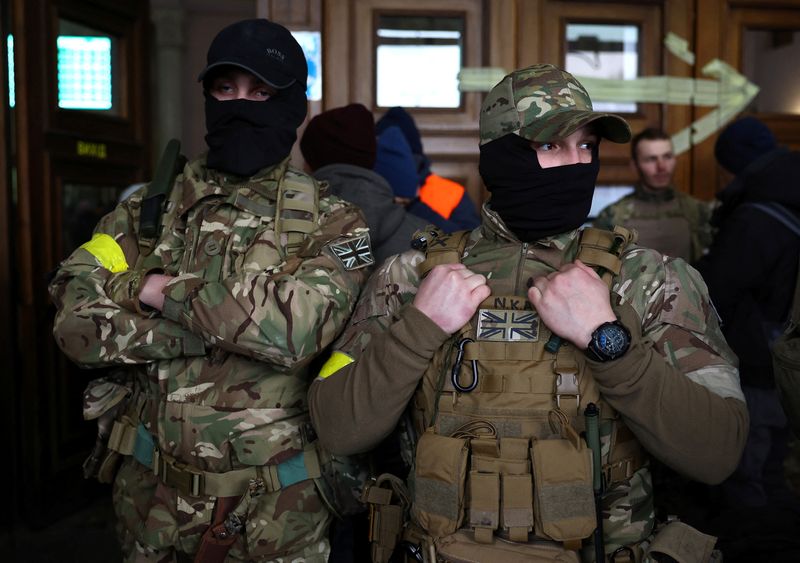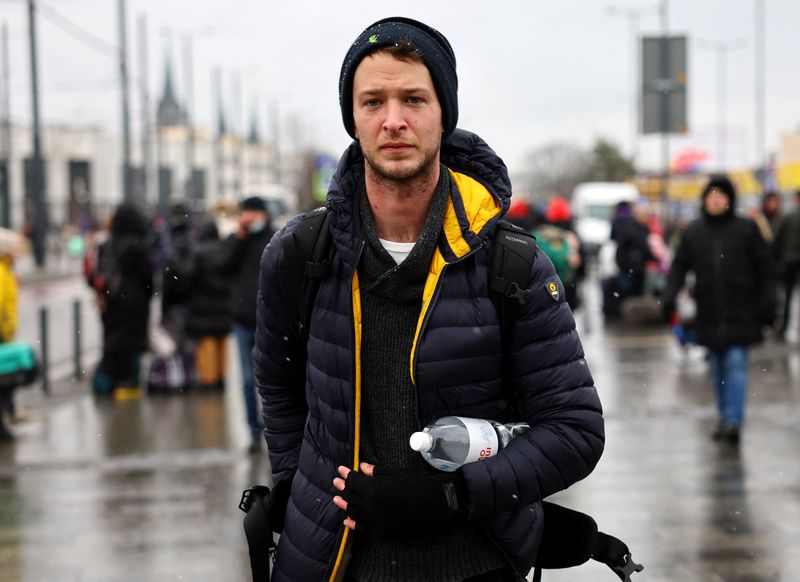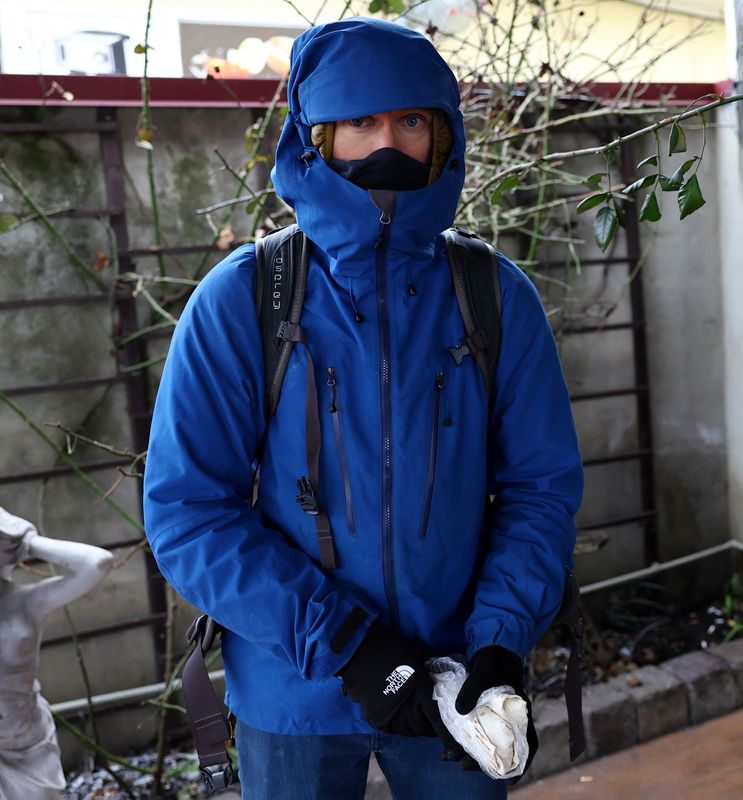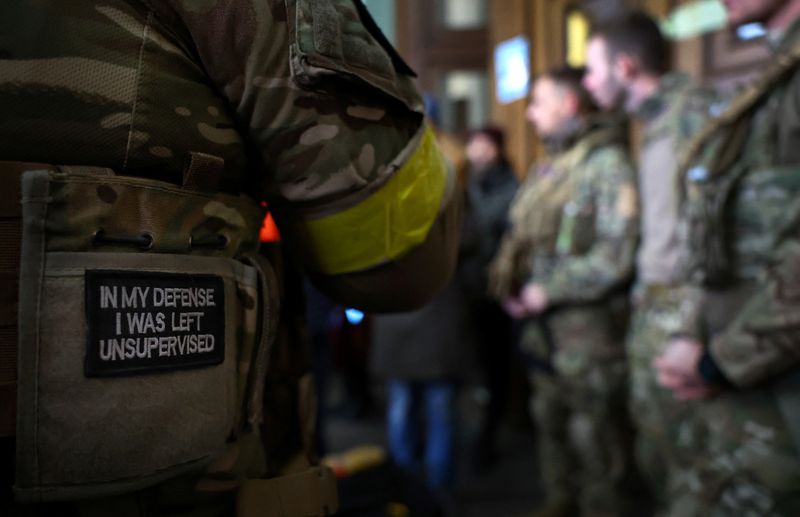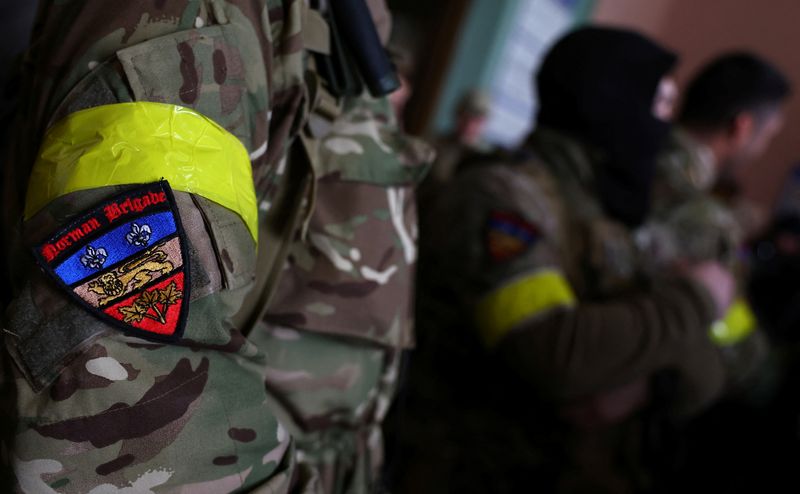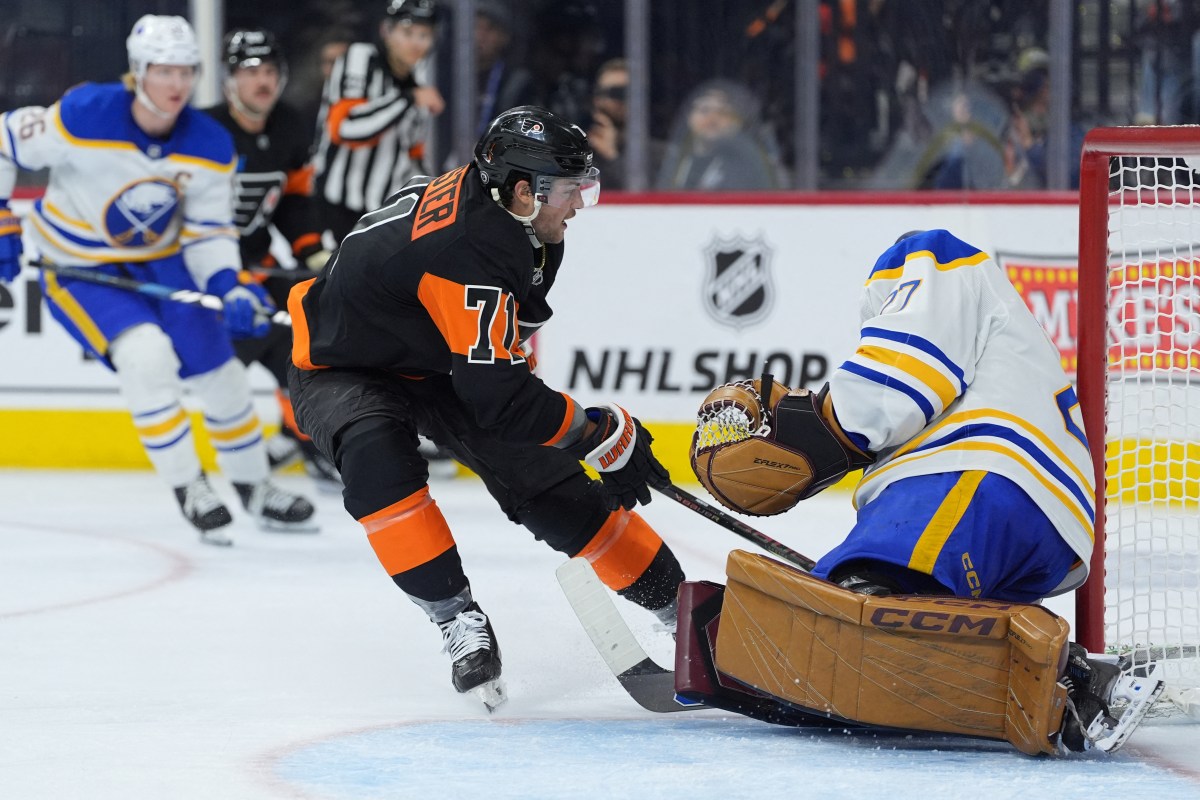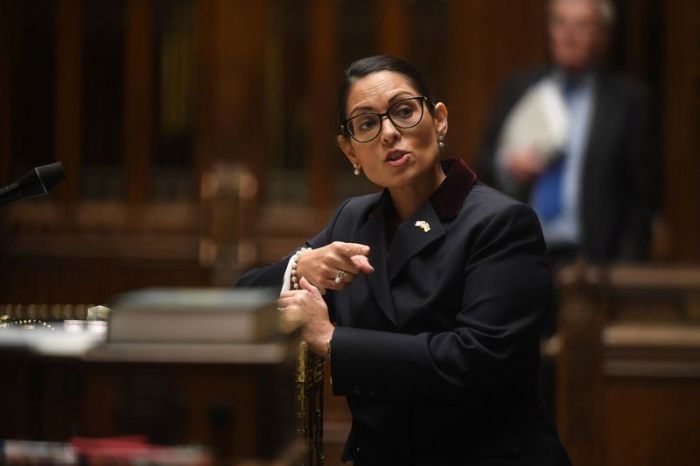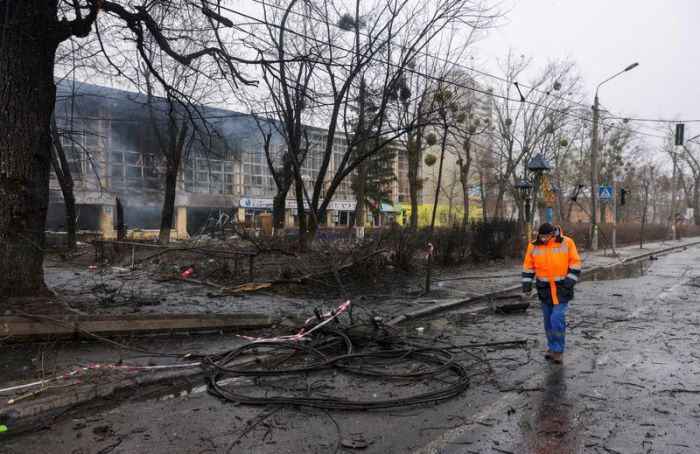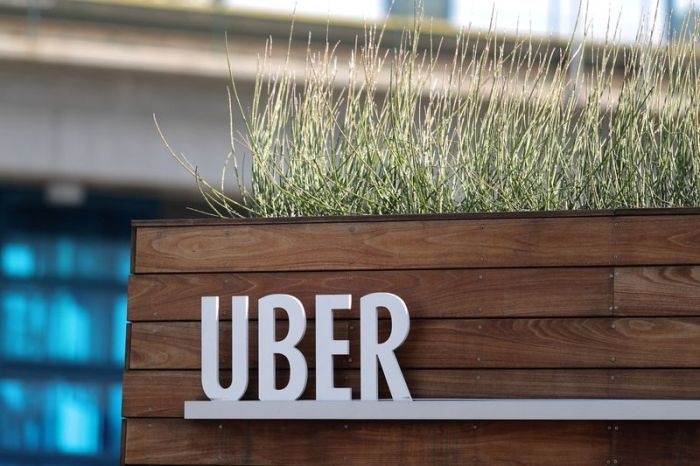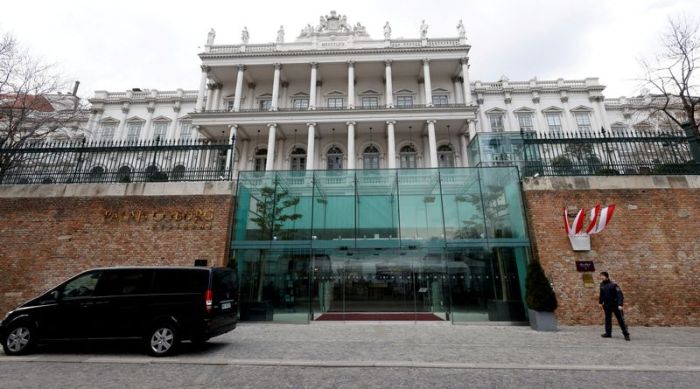(Updates lede with more information about Michael Ferkol’s former role in U.S. Army.)
LVIV, Ukraine (Reuters) – Michael Ferkol, who who once served as a supply specialist with engineer battalions in the U.S. Army, had been in Rome studying archaeology when he heard the Ukrainian president’s appeal for foreign fighters.
Within days, Ferkol said, he presented himself at a military recruiting office in the western Ukrainian city of Lviv, hoping to be taken on as a frontline paramedic.
“I told them I wanted to triage patients,” said the 29-year- old, who has no combat experience. “There was a Finnish guy there too, and he was like, ‘I just want to kill Russians.'”
Ukraine has established an “international” legion for people from abroad and President Volodymyr Zelenskiy has publicly urged foreigners to “fight side-by-side with Ukrainians against the Russian war criminals” to show support for his country. Last week, Zelenskiy said that more than 16,000 foreigners had volunteered, without specifying how many had arrived.
Some foreign fighters arriving in Ukraine say they are attracted by the cause: to halt what they view as an unprovoked attack in a once-in-a-generation showdown between the forces of democracy and dictatorship. For others, many of them veterans of Iraq and Afghanistan, the Ukraine war also offers a chance to use fighting skills they felt their own governments no longer appreciated.
Reuters interviewed 20 foreign fighters or others involved in the effort, and some said that Ukraine is struggling to vet, equip and deploy them.
And alongside battle-hardened veterans of war, people are arriving with little or no combat experience, offering limited value in a war zone under constant, terrifying shelling by the Russian military. One man who identified himself as British military veteran referred to these recruits as “bullet-catchers.”
A senior Ukrainian official in Lviv involved in processing newly-arrived foreign volunteers, Roman Shepelyak, said the system to receive, train and deploy foreign fighters was still in its infancy, and that the process would get smoother in the coming days. Ukraine’s defence ministry declined to comment.
Russia launched its invasion of Ukraine on Feb. 24, calling it a “special operation” to demilitarize Ukraine and capture dangerous nationalists. Ukraine’s armed forces are heavily outnumbered by Russia’s but have mounted significant resistance.
Among those who have arrived to fight for Ukraine are dozens of former soldiers from the British Army’s elite Parachute Regiment, according to an ex-soldier from the regiment. Hundreds more would soon follow, he said. Reuters was unable to corroborate those numbers.
Often referred to as the Paras, the regiment has in recent years served in Afghanistan and Iraq. “They’re all highly, highly trained, and have seen active service on numerous occasions,” the ex-soldier from the regiment said. The Ukraine crisis will give them purpose, camaraderie and “a chance to do what they’re good at: fight.”
Michael Ferkol said there were many people with Ukrainian ancestry in his hometown, Chicago. He wanted to go to Kyiv, the capital, “and help out.”
“I’m a little nervous, to be honest,” he said, making his way through crowds of refugees at Lviv train station on Saturday, hoping to board a train to the frontline. “But at the same time, it’s not about me. It’s about the people that are suffering.”
‘HAVE GUN WILL TRAVEL’
For some, travelling to Ukraine, even from far-away countries, was the easy part. Those who hadn’t brought body armour, helmets and other equipment with them were struggling to source them in Ukraine, according to several fighters Reuters spoke to.
Some veterans were sharing information on equipment and logistics through invite-only Facebook or WhatsApp groups with names like “Have Gun Will Travel.” These groups contain appeals for equipment, such as body armour and night-vision goggles, or for foreign veterans who are snipers or who can train Ukrainian soldiers in how to use sophisticated weapons that Western countries are sending.
With a vast mobilisation of Ukrainian men underway, the country has plenty of volunteer fighters. But there is a shortage of specialists who know how to use Javelin and NLAW anti-tank missiles, which professional soldiers train for months to use properly.
Even those with combat experience might struggle in Ukraine’s war zones, warned a former British soldier, who asked to be identified by his nickname, Kruger. He said he had served in Afghanistan and trained other soldiers.
“If you’re out here as a war tourist, this is not the place for you,” he said. “The realities of war, if you head out to the front, are going to be pretty overwhelming.”
Many of those arriving in Lviv end up at the semi-fortified offices of the Lviv regional administration, where their paperwork is checked by Shepelyak. He heads the region’s department for international technical assistance and cooperation. He acknowledged the system for processing those offering to fight was still in its infancy.
On Friday, when Reuters visited, six foreigners appeared at Shepelyak’s office, including a Polish military veteran called Michal, and a giant, heavily-tattooed Dutchman called Bert. Both men declined to give their full names.
More foreigners were arriving every day, Shepelyak told Reuters. “If they have such a desire and persuasion to serve a foreign country, it matters. They are important.”
Shepelyak said he vetted their paperwork, but not their combat experience, which was evaluated at a military base outside Lviv where they were sent next. He added that those recruited into the Ukrainian army would be paid in line with other soldiers.
Other foreign fighters told Reuters they were bypassing the formal processes and heading straight for the eastern front, hoping to get weapons and orders from the Ukrainian military upon their arrival.
DELAYED DEPARTURES
The logistical issues have prompted some fighters to delay their arrival.
Anthony Capone, a wealthy healthcare entrepreneur in New York City, said he is providing funding for hundreds of ex-soldiers and paramedics who want to go to Ukraine. But he said he had delayed their departure “to give the Ukrainian army another week to improve their enlistment process for those entering the volunteer corps.”
So far, according to Capone, only a “small number” had arrived in neighbouring Poland. Capone had posted on LinkedIn his message offering funding, thinking that 10 or 15 people would reply. “Right now, I’m at about 1,000,” he said.
Capone added he was only funding ex-soldiers whose military credentials he could verify, or paramedics who currently worked in an emergency trauma setting.
About 60% of those who had been in touch were American and 30% European, with the remainder hailing from at least 25 countries as far-flung as Colombia, Japan and Jamaica, Capone said.
Most were ex-soldiers; the rest were emergency medics or critical care nurses. They’re willing to “defend a country they’ve never visited,” said Capone, a specialist in computational learning theory.
The U.S. government has discouraged citizens from travelling to Ukraine to combat Russian forces. Some countries have issued stronger warnings, including Britain. Others, such as Canada or Germany, have cleared the way for their citizens to get involved.
A CONNECTION IN KYIV
In central Lviv on Thursday, a burly, Russian-speaking Canadian, who identified himself only as Sig, heaved bags of equipment into the back of a minivan he had bought in Poland and driven to Lviv.
He wore a flak jacket bristling with medical tools, and said he usually worked as a civilian paramedic.
Another of Sig’s four-strong team was an American who said he was born in the former Soviet republic of Georgia and had fought Russians “for generations.”
In Sig’s bags were hundreds of kilograms of equipment, including medical supplies and military rations known as MREs, or meals ready to eat. Sig said his team planned to help train Ukrainian volunteers in Lviv for a day, before heading straight for the front.
“I have a connection in Kyiv who will help us out,” he said.
Standing outside the ticket hall of Lviv station on Sunday were a group of British men in military uniform, waiting for a train to Kyiv. They were in high spirits, often exchanging fist-bumps and handshakes with Ukrainian refugees who thanked them for fighting for their country.
They were led by Ben Grant, a strapping Englishman from Essex, who said he had served in Britain’s Royal Marines and had just completed a stint as a security advisor in Iraq. He was unclear whether his men would be deployed independently or as part of a Ukrainian unit.
Of the Ukrainian soldiers, Grant added: “They seem strong – really strong. I’m more than happy to fight next to them.”
(Reporting by Andrew R. C. Marshall in Lviv, Ukraine; Additional reporting by Jacqueline Thomsen and Phil Stewart in Washington, DC, and Shariq Khan and Medha Singh in Bengaluru. Editing by Cassell Bryan-Low)

